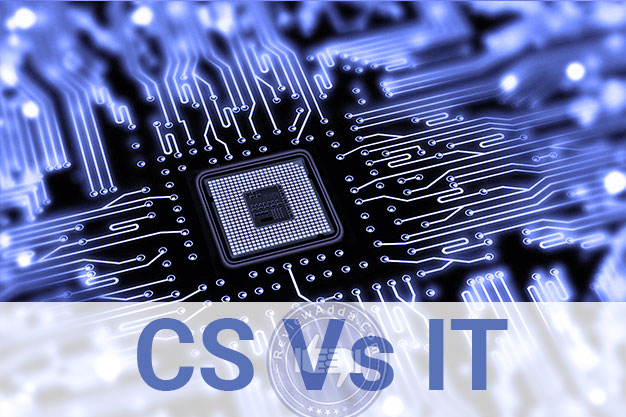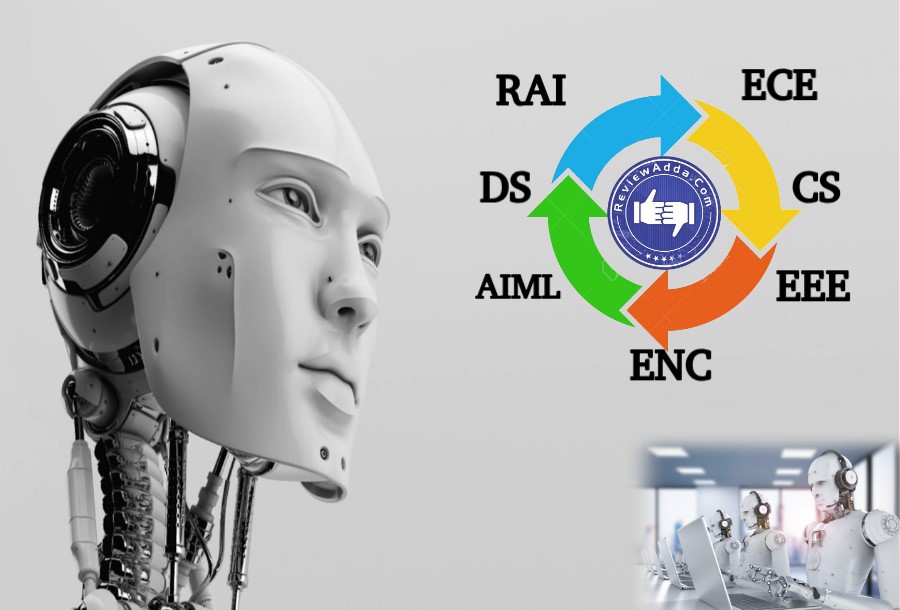Topic We Cover: Myth About CS vs IT Course
1. History of CS and IT courses
2. Difference between CS and IT course structures
3. Industrial difference
4. CS v IT: Placements
5. IT v CS: Salary
6. CS v IT: Growth
7. CS: Concern for the future
8. CS v IT: Conclusion
It was always coming down to this.The days of mechanical, civil and electrical being the only reliable streams of engineering are finally over. The Silicon Valley boom gazumped engineers in the West during the early 1970s. IBM had started rolling out mainframe computers for big and small companies. The establishment there gave little importance to modules like user interface and accessibility. The rise of Apple and later Microsoft compressed IBM out of the market and heralded the era of application based computing.Also view GATE Registration details for 2019.

CS vs IT. The dilemma students face every year as they hope to make the right choice.
History of CS and IT courses
These events created a massive demand for CS engineers and technicians proficient in writing code. To meet this demand, top universities in the US changed their engineering curriculum drastically to suit industry needs.
This evolution took time to reach Indian shores. Until the late 90s, mechanical and civil were still the preferred choice amongst students. As Indians started integrating computers into their daily lives and foreign companies started turning to young Indian talent for IT services, the evolution of engineering colleges in India began.
Computer Science (CS) and Information Technology (IT) are the pillars on which the modern technological revolution has spread its wings. Engineering aspirants flock to CS and IT branches as soon as results and ranks are declared. Every digital appliance today has functionalities associated within the purview and guidance of CS and IT engineers.
The world biggest corporation and the richest person in the world, both remain closely knitted to the CS and IT industry. This clearly highlights the impact these companies have had over the recent years. From oil drilling companies and automobile and weapon manufacturing, the tech business has now outpaced them all and emerged as the pathway to future innovations.
So what is the difference really? CS and IT are often clubbed together as two fields with overlapping sections. The IITs have further highlighted this point by not having any course for IT as they deem CS broad enough for an aspiring tech engineer.Which is better, CS or IT?
Difference between CS and IT course structures
Despite what is usually said, CS and IT have some fundamental differences.
Imagine you’re building a rocket to Mars. The project essentially requires three different teams.
Team A is tasked with mechanically assembling the parts required for building the rocket. From buying the material required to build the rocket to shaping it properly and finally assembling it. This team can essentially be called computer engineers. They have knowledge about building systems from the ground up, but are not concerned about the inner functionality or running of the system
Team B is tasked with implementing systems which are required for running of the rocket. These tasks include designing fuel valves, installing visual systems for astronauts to use, creating monitoring systems to gauge trajectory and fuel consumption. Team B can be called as CS engineers. They have acute understanding of the fundamentals of computer languages and the algorithms used behind developing code.
Team C can essentially be called the astronauts. They use the systems created and monitored by Team A and B to ensure successful flight of the rocket. As you may have guessed, Team C is an analogue for IT engineers. They use systems and languages developed by computer engineers and computer scientists to match the requirement of the user.
Industrial difference
As mentioned above, the fundamental differences in the structure of CS and IT warrants a general differentiating line between the two departments. Some portfolios grabbed by both CS and IT engineers are
|
CS |
IT |
|
Application Software Developer Top softwares used on desktops these days are a testament to the talent and importance of software developers. MS-Office, VLC media player or Google Chrome are merely some examples of the many applications software developers have introduces over the years |
Network Security Analyst Security Analysts work to remove loopholes and conjectures in business security systems. They also create distress plans and develop verification processes to create secure security systems online. |
|
System’s Engineer Developers create the software, but on what platform does the software run on? This is where system’s engineers play their part. Instrumental in the building of Oss(Operating Systems), system engineers strive to build the perfect platform for application developers to run their softwares upon |
Network Architect True to its name, Network Architects plan and setup communication networks. These networks can be local (LAN), wide area (WAN) or in-house intranets. |
|
Web Developer Often confused with graphic designing, web developers are tasked with handling the code which runs the website. They have to integrate all types of media on the website into one cohesive juggernaut. The recent trend of internet companies sprouting up across India has increased the demand for quality engineers. |
System’s Administrator The maintenance and running of networks designed by network architects is done by system administrators. Their responsibilities wary from handling business related intranets to LAN, MAN and WAN. |
CS v IT: Placements
The question is an intriguing one. CS is essentially proposing a scientific approach to computers. Every aspect of modern day computing is rationalized and explained to CS students. The choice 15 years ago would have been a no brainer. Because of a dearth of engineers in the computers industry at that time, CS engineers were much more preferable over their IT counterparts due to their versatility.
 Get Updated Review ( Voice Based Alumni Feeback)
Get Updated Review ( Voice Based Alumni Feeback)
-
 Check Review (Alumni Feedback) - Lovely Professional University - [LPU] – Click Here
Check Review (Alumni Feedback) - Lovely Professional University - [LPU] – Click Here -
 Check Review (Alumni Feedback) - Amity University – Click Here
Check Review (Alumni Feedback) - Amity University – Click Here -
 Check Review (Alumni Feedback) - Apeejay Stya University – Click Here
Check Review (Alumni Feedback) - Apeejay Stya University – Click Here -
 Check Review (Alumni Feedback) - SRM University Sonipat – Click Here
Check Review (Alumni Feedback) - SRM University Sonipat – Click Here -
 Check Review (Alumni Feedback) - Ansal University – Click Here
Check Review (Alumni Feedback) - Ansal University – Click Here
In the current climate, IT engineers have created a strong place for themselves in the industry. With so many CS graduates in the current jobs market, companies are more interested in specificity and niche skills. While CS is still a highly valued field, IT is no longer a less attractive option.
The main difference cited in CS and IT was the bare fundamentals. However, recruiters these days are less interested in course structure at universities due to plummeting standards of graduating CS and IT engineers in the country. The emphasis now is more on ability to handle specific tasks such as data mining, internet security, computer and network architecture etc.
A good IT engineer is much more valuable than an average CS engineer. If an engineer possesses an appropriate skill set, he/she is never going to struggle looking for a job.
In terms of making a choice, industry forces have made the choice very simple. Aspirants can choose whichever branch appeals the most to them without worrying about job prospects. The dynamic landscape of the tech industry will always throw up enough jobs for decent CS and IT engineers.
IT v CS: Salary
For many students, it all comes down to this. Money speaks, and often loudly. After four gruelling years of engineering, nothing lights a CS or IT engineer’s face better than a bumper salary package.
Average salaries across both fields are very similar. Due to the general overpopulation of CS and IT engineers in the country, packages have fallen down drastically over the past few years. A tabular comparison has been done below.
|
Computer Science (CS) Packages in INR |
Information Technology (IT) Packages in INR |
||||
|
Computer Programmer |
Software Developer |
Hardware Engineer |
Web Developer |
System Analyst |
Network Architect |
|
3.75 LPA |
4.36 LPA |
2.04 LPA |
2.86 LPA |
3.53 LPA |
4.45 LPA |
Average packages for CS is Rs. 3.38 LPA and Rs. 3.61 LPA for IT engineers.
Please note these packages are an average total of CS and IT engineers from all colleges. Engineers from IIT and top NITs are offered much higher packages.
As expected, there isn’t a great difference in packages for CS and IT engineers. This trend is expected to continue further, as internet integration into various electronic devices still remains a great opportunity. The ubiquity of electronic devices will usher a new phase in the tech industry.
The ball is in the court of the universities for now. If they manage to reform the course structure to meet the demands of an ever-changing industry, there will be enough prospects for CS and IT engineers.
CS v IT: Growth
While packages and fundamentals follow a similar trajectory, CS and IT have varying job growths across varying designations.

Growth variations between CS and IT positions in the tech industry
Quite surprisingly, IT openings show much more potential over time than CS jobs. This trend can be analyzed as follows.
While CS offers a more rounded approach to computer science, it lacks in providing industrial skills necessary to go higher in a particular position. In other words, CS isn’t as ‘marketable’.
The reasons are many. Unlike early years when the tech industry was in its infancy and people were judged based on their all round knowledge and versatility, thus preferring CS engineers. Companies have now become much more specific and clear in their requirements.
IT engineers, due to in depth knowledge in certain industry related areas, rise faster in tech companies who constantly need experienced engineers higher up the command chain. Many companies abroad have started to prefer IT professional over CS graduates who have scattered talents in many fields.
That is not to say CS graduates lack the skill set to succeed. Compared to other branches like EC, EE and Mechanical, CS is still a more lucrative option. However, because of lack of industry targeted courses, CS engineers are falling behind their IT counterparts.
The problem essentially is fundamental.
CS: Concern for the future
The future of CS is bright, but does it lack direction and vision?
Computer science, like its name, is a pure science. A student studying computer science in college becomes a CS engineer, while in purist terms he/she is actually a computer scientist.
Many people tend to ignore this major flaw. Using computer science (CS) courseas engineering major is not the right way to approach such a broad and vivid field. Consider other engineering disciplines such as ECE or Mechanical. Both fields have a clear agenda to treat every subject based upon a practical phenomenon which directly goes into use in industries.
Every engineering field is based upon a pure science. Mechanical has classical physics, civil has structural physics, chemical has chemistry and EC has electrodynamics.
Computer science has computer science. And here is the problem.
Instead of trying to force specificity into CS by dropping portions, the focus should turn to perfecting the IT curriculum. For better all round education and competition, CS should be turned into a Bachelor of Science course. This will define its importance better and encourage only truly passionate students to pursue the subject, rather than a horde of students jumping on the bandwagon.
CS v IT: Conclusion
Upon analysis of course structure, salary and growth, it is apparent that IT is a more sustainable field with better growth. Does this mean complete alienation of CS?
Top engineering colleges in India are still setting CS cutoffs highest every year. As far as the near future goes, CS will be the most popular branch of engineering in India. However, every industry in every country has its own way eventually. If growth in IT sector maintains the same numbers it is currently at, one can expect a power shift from CS to IT after a few years. Until then, CS still seems to be the king.Computer science careers will continue to blossom.







